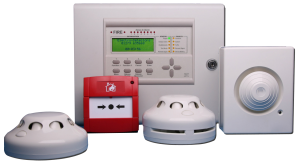F alse fire alarms are a prevalent issue for fire services up and down the country.
alse fire alarms are a prevalent issue for fire services up and down the country.
To demonstrate how widespread the problem is, figures show the UK fire and rescue services were erroneously called out to more than 200,000 incidents in the last year.
That is a lot of wasted time and resources. This article will look at the main culprits that cause false alarms and what can be done to reduce their occurrence.
Firstly, why are false fire alarms a problem?
False fire alarms are at best a waste of time and at worst, can lead to deadly complacency.
If your business has unnecessary fire alarms, you will be disrupting work and reducing your employees’ productivity. Furthermore, repeated unnecessary fire alarms which involve the fire service can also lead to you being charged as a punitive measure, and as a deterrent to letting the situation continue.
Clearly, if the fire service is responding to your false alarm then they are unable to respond to an actual emergency which is a waste of resources and potentially dangerous.
Furthermore, repeated false fire alarms could result in your staff treating an alarm with complacency and not responding in the necessary fashion for an actual fire; on the extreme end of the scale, this could be fatal.
Common causes of false fire alarms
- Apparatus malfunction/poorly maintained apparatus: in 2015-16, 66% of false alarms were due to an error with the apparatus
- Steam
- Burnt cooking
- Dust, e.g. from building work
- Accidental triggering
- Malicious triggering, e.g. pranksters
Prevention
The first step to preventing false fire alarms is identifying what their main source is in your individual circumstance.
If, for example, accidental triggering is a recurring problem, consider getting plastic covers for your fire call points. Alternatively, for malicious triggering, installing CCTV can deter, and help you catch, the guilty party. If steam or cooking smoke are a problem, creating better ventilation for these areas could help.
A wide-ranging solution, and good general practice, is carrying out frequent fire alarm checks to help you prevent issues before they occur.
Increasing maintenance of fire apparatus will help deter insects, and any dust/dirt build-up or faults can be remedied early on.
Make sure you at least stick to the maintenance schedule for your apparatus set out in your fire risk assessment.
Another useful step to take is to ensure that you have appropriate alarm systems installed for your business.
Professionals, such as those at Protect & Detect, can discuss with you the best fire alarm system for your premises.
Potential causes of false fire alarms are old or inappropriate fire alarm systems.
For example, reports find that single sensor detectors, the older style of system, can be liable to sounding erroneously more often than multi-sensor detectors, a newer alarm technology.
Multi-sensor detectors are sensitive to more than one cue of fire, e.g. smoke and heat, and so increase speed of detection whilst reducing false alarms.
If you are having issues with the reliability or suitability of your business’ fire alarm system, get in touch with Protect & Detect for help in remedying your problems.
We are a fully accredited fire and security company, with an outstanding reputation, who can supply, install and maintain your chosen alarm system.
Contact Protect & Detect for further information about our systems or services.
Protect & Detect is a leading fire safety and security company, servicing Ipswich, Colchester, Cambridge, Bury St. Edmunds, Chelmsford and beyond.
Protect & Detect offers a wide range of fire safety and security services including; fire alarms, fire extinguishers, burglar alarms, intruder alarms, fire sprinkler systems, access control, door entry systems, CCTV, barriers, nurse and warden calls. Contact our friendly team today for a quick quote.

